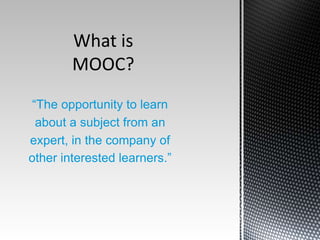—Å–∞–º–æ–æ—Å–≤—ñ—Ç–∞ –æ–Ω–ª–∞–π–Ω. —Ö–∞—Ä—á–µ–Ω–∫–æ —ñ.–≤.
- 1. “The opportunity to learn about a subject from an expert, in the company of other interested learners.”
- 2. There are MOOCs available within all of the following categories: Pre-university Undergraduate level Masters level Continuing professional development Vocational Technical
- 3. Advantages • Courses open to anyone with an internet connection. • Non-certified courses completely free. • Option to gain certification and accreditation for course completion. • Single-unit study allows personalisation of learning to suit individual requirements. • Option to work completely at own pace. • Peer-collaboration promotes new ideas and ways of thinking. • Discussion forums allow learners to organise and put-forward own thoughts. • Individual study develops selfdiscipline and motivation. Disadvantages • Courses are currently not as reputable as University-accredited courses. • Self-motivation required often leads to non-completion of courses. • Lack of real-world access to specialised equipment – e.g. laboratory equipment. • Lack of real-world interaction with other people. • Without qualified instruction over a whole course, students may not realise they need to study additional modules for a complete understanding of a subject area. • Peer-review not as accurate as teacher-review – especially for assignments involving critical thinking skills.








